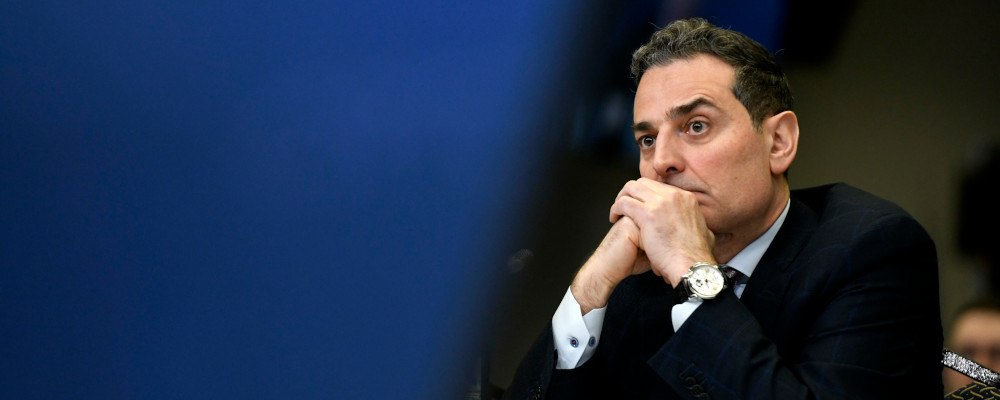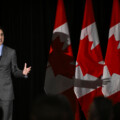The news media in Canada is in crisis. Policy responses to date are failing to solve for the information that citizens need to make informed decisions about important issues and debates. The Future of News series brings together leading practitioners, scholars, and thinkers to imagine new business models, policy responses, and journalistic content that can support a dynamic future for news in Canada.
After watching the grilling that Bell’s chief executive got from lawmakers earlier this month, it’s tough to be optimistic about the future of the news business in Canada.
Bell’s Mirko Bibic appeared before parliament’s heritage committee on April 11 to answer questions about his decision to cut 4,800 jobs at the telco, including just over 400 layoffs at the company’s media division.
What transpired were two hours of extremely aggressive interrogation, from all four parties.
We heard that Bell is profitable and raising dividends. That its executives are making millions while accepting subsidies. And yet they are firing workers, laying off journalists, paring back regional TV news broadcasting, and selling off radio assets. The general gist was to accuse Bell of some variation of corporate greed.
It’s not a stretch to say the committee showed little curiosity about the underlying economic and business rationale of the decision or had any interest in debating the CEO of Canada’s largest private broadcaster about possible policy solutions.
This was a missed opportunity.

Navigating a future for Canadian news is still unfinished business for policymakers.
Legacy content like conventional news and television is facing existential challenges from global tech giants who are stealing their viewers and advertisers. Consumers have more choice than ever and are no longer bound to scheduled broadcasting or conventional distribution platforms.
In Canada, there’s a very tightly-knit link between telecommunications, broadcasting, and news.
Telecom companies like to own media assets because they see opportunities to integrate content with distribution. This is why Bell owns CTV and TSN and Rogers owns Sportsnet and Citytv. And why Bell and Rogers jointly own the Toronto Maple Leafs.
But to own a license to broadcast and operate conventional TV networks, companies are obliged to provide news. It’s a condition of the license.
In recent years, however, the mutually reinforcing compact between telecoms, broadcasting, and news has been breaking down. Every part of that trinity is facing severe stress.
Bibic reminded lawmakers that Bell’s losses at its news division totaled $40 million last year, while its marquee CTV broadcasting franchise lost $180 million.
A report issued by marketing research firm Convergence Research Group last month predicted that a majority of Canadian households won’t have a subscription to a TV provider by the end of 2026.
It’s worth noting that shares of Corus Entertainment—a standalone media company that owns Global Television and Global News—lost more than one-quarter of their value after the company reported a $10 million loss in its latest quarter a week ago.
The telecom side of the business is also facing pressure.
The capital-intensive nature of the telcos means they are struggling globally under the weight of higher interest rates. The regulatory framework in Canada has become increasingly adverse as the government tries to increase competition. A weakening Canadian dollar is driving up the costs of imported equipment needed to build out broadband networks. It’s a difficult operating environment.
All of Canada’s telecom companies have seen significant declines in their market capitalization over the past two years, except for Quebecor which has been the beneficiary of new rules and policies to open up the telecom market.

This is the business backdrop for Bell’s decision to restructure its media business. It’s why telecoms have become less willing to carry losses on news and other forms of media, and why they are scrambling to find new audiences for their newsrooms.
The governing Liberals have sought to fix some of these problems through a combination of internet regulation, taxation of tech giants, and direct funding of news providers.
It’s a controversial approach, however, in part because of how it threatens to undermine media independence and curtail Internet freedoms. The financial impact may not even be very material anyhow. Regardless, the framework won’t survive a change in government.
There are other ideas out there to help support the industry, many of which have been discussed here at The Hub. Still, the search continues for clear-cut and replicable models to operate news delivery commercially on a large scale. There are many localized and small success stories, like The Hub. Few big ones.
Bell, which goes by the corporate name of BCE, says it remains committed to news and is restructuring the business to ensure it survives in the digital age. It even claims to have increased the number of journalists by 35 percent.
It’s not clear how long that commitment will hold as losses mount and the benefits of holding broadcasting assets wane. And the regulatory pressures undermining their core business will only dampen the appetite of telcos to invest in loss-making divisions like news.
All this leaves policymakers facing some difficult constraints.
In an ideal world, we get cheap telecom services, minimal regulation of the internet, and robust news ecosystems financed by the telcos. In the real world, at least one of those objectives may need to be abandoned. Policymakers get to decide which one.
The Future of News series is supported by readers like you and Meta.
Recommended for You

The Notebook by Theo Argitis: Carney’s One Big Beautiful Tax Cut, and fresh budget lessons from the U.K.

Ginny Roth: How vacant liberal nationalism left Canada worse off than George Grant even imagined

Peter Menzies: Justin Trudeau’s legislative legacy is still haunting the Liberals

‘Our role is to ask uncomfortable questions’: The Full Press on why transgender issues are the third rail of Canadian journalism




